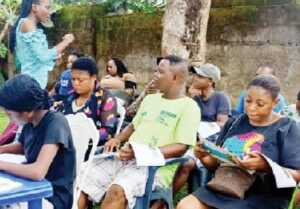See the Numbers of Thousands of People C’River ‘Project Grow’ trains for Farming
See the Numbers of Thousands of People C’River ‘Project Grow’ trains for Farming

The Cross River State Project Grow Initiative, in collaboration with the AFOS Foundation, has unveiled plans to train and empower 100,000 agribusinesses, with a special focus on youth and women, across all 18 local government areas of the state.
Dennis Ikpali, the state Project Director, shared this development in an interview with reporters in Calabar on Tuesday. He explained that ‘Project Grow’ is a public-private partnership aimed at training 5,000 farmers in each of the state’s 18 councils every quarter over the next four years. The program will emphasize Good Agricultural Practices (GAP), financial literacy, record keeping, and cooperative management to boost the state’s agricultural productivity.
Ikpali stressed that addressing food production should not be politicized, as this would only worsen the challenges posed by hunger and its associated issues. “The primary goal of this initiative is to scale up food production and commercialize agriculture. With the state’s population growing rapidly, traditional subsistence farming is no longer enough to tackle food insecurity,” he said.
To achieve this vision, the state has established 54 training centers across the 18 councils. These centers will train farmers in GAP, financial management, and cooperative operations, helping them to collaborate and optimize their efforts. Each training session spans three weeks, with each batch of farmers trained for four days, culminating in certification. The current quarter’s target is to train 5,000 farmers and connect them with financial institutions for funding opportunities.
Ikpali emphasized the importance of commercial farming through sustainable value chains, which will generate liquidity, enhance food resilience, and contribute to economic growth. “We need to move beyond subsistence farming and adopt commercial practices to tackle hunger and promote economic development,” he said.
Olatunji Moses, Project Coordinator for the Smallholder Farmers’ Programme at AFOS Foundation, highlighted that the training focuses on smallholder farmers within the maize and cassava value chains. He expressed satisfaction with the farmers’ enthusiasm, noting that the program is designed to equip them with the skills needed to increase productivity, profitability, and income.
Journalists recently visited four training centers in Calabar Municipality and Calabar South, where they spoke with Mrs. Marian Kusi, one of the beneficiaries. Kusi, a long-time farmer of cassava, maize, water leaf, and pumpkin, shared that although she had farmed for years, she had been making numerous mistakes, particularly in fertilizer usage. “Thanks to this training, I now have a clearer understanding of best practices. I believe I can significantly improve my farm’s output,” she said.
Kusi also expressed hope that the program would reach farmers in more remote areas who lack access to proper agricultural information. “This training has been eye-opening, and I hope it extends to those in the hinterlands, enabling them to increase their yields and form cooperatives for better access to resources,” she added.
TRENDING SONGS
 Wedding Called Off: How Lady Cancels Wedding After Finding Out Finance’s Affairs With Her Bestie
Wedding Called Off: How Lady Cancels Wedding After Finding Out Finance’s Affairs With Her Bestie
 Heartbreak in Ikeja: Lady Weeps After Fufu Found in New Phone Package
Heartbreak in Ikeja: Lady Weeps After Fufu Found in New Phone Package
 Twist of Fate: Man Who Questioned Phyna’s ₦1Billion Demand Mourns Brother in Dangote Truck Crash
Twist of Fate: Man Who Questioned Phyna’s ₦1Billion Demand Mourns Brother in Dangote Truck Crash
 Tragedy in Enugu: Dangote Truck Claims Lives of Family of Five
Tragedy in Enugu: Dangote Truck Claims Lives of Family of Five
 Bangkok Crackdown: Nigerian-Thai Couple in Police Net Over Drug Trafficking
Bangkok Crackdown: Nigerian-Thai Couple in Police Net Over Drug Trafficking
 Family Rift: Reno Omokri’s Ex-Wife Says He Deserted Their Special Needs Son
Family Rift: Reno Omokri’s Ex-Wife Says He Deserted Their Special Needs Son
 The Man Who Sent Money for Two Decades, Only to Return to an Empty Shell
The Man Who Sent Money for Two Decades, Only to Return to an Empty Shell
 See how a young lady was beaten in a village and naked for stealing a goat
See how a young lady was beaten in a village and naked for stealing a goat
 See How Man That Plans to Divorce His Wife, Gets Shocked When She Leaves Him First With Their 5 Kids
See How Man That Plans to Divorce His Wife, Gets Shocked When She Leaves Him First With Their 5 Kids
 Tragic Land Dispute: Man Kills Father in Imo, Pastor Arrested for Rape
Tragic Land Dispute: Man Kills Father in Imo, Pastor Arrested for Rape
Share this post with your friends on ![]()













